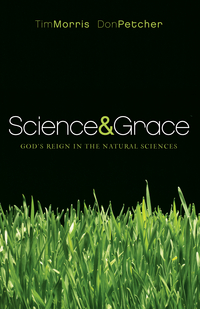Tim Morris and Don Petcher: Science and Grace
 Tim Morris and Don Petcher, Science & Grace: God’s Reign in the Natural Sciences (Wheaton: Crossway Books, 2006), 352 pages, ISBN 9781581345490.
Tim Morris and Don Petcher, Science & Grace: God’s Reign in the Natural Sciences (Wheaton: Crossway Books, 2006), 352 pages, ISBN 9781581345490.
Morris (PhD in cellular and molecular biology) and Petcher (PhD in elementary particle physics) originally hoped to write a book about a theology of science for an explicitly Evangelical audience that had some familiarity with the science and religion dialogue. They realized, however, after beginning that a more general audience would also benefit from an introduction to a Christian perspective of the relation between science and religion. The main goal of the book, in fact, is to suggest ways in which the people of God can think faithfully about science, and yet not allow science to dictate the meaning of the gospel. Morris and Petcher thus attempt to develop a “theology of science” (i.e., science shaped by theology) that employs Christian convictions about God’s faithfulness to his creation. While more and more scientific advancements seem to challenge basic beliefs in Christianity, the authors assert that there is truly no dissonance between the two when viewed appropriately. Science and religion, according to the authors, dovetail nicely and both serve to increase the adoration of God.
Morris and Petcher successfully provide a Christian perspective as to the power of science as well as its limitations. For those who see their science as separate from their faith, this book will be challenging. Morris and Petcher discuss how science is inextricably tied to one’s worldview. Therefore, the interpretations of scientific analyses impact one’s worldview.

Tim Morris

Don Petcher
A basic outline of the book could be presented as discussions of four relations: 1) humanity’s relation to God, 2) humanity’s relation to itself, 3) humanity’s relation to the world, and 4) God’s relation to the world. Pneuma Review readers would be well served by a close reading of the first three chapters of this book, as Morris and Petcher give a wonderful review of the rise of the scientific methodology in the modern world. I will focus my review, however, upon the second section of this book wherein Morris and Petcher attempt to emphasize the centrality of the Trinity in the original creation, its redemption, and the sustenance of creation. Morris and Petcher, both, are Reformed in their theology. As a consequence, their theological extrapolations may be at odds with various readers of the Pneuma Review. For example, in speaking of the Trinitarian roles within creation and its sustenance, they assert that the persons of the Trinity have essentially the same roles as they have in redemption. Implicit, then, is primacy given to Christ in creation and somewhat relegating the Spirit to a peripheral role. One perceives a strong Christological focus throughout this book. For example, many of the roles traditionally given to the Spirit within the Trinity are given to Christ by Morris and Petcher in this book. It seems to me that they errantly equate Trinitarian with Christological. This way they reassert the Son’s activity within the created world but perhaps unintentionally denigrate the Spirit’s role within the world. In fact, Morris and Petcher relegate the Spirit’s role to be one of mere sustenance within the created world (107). In so doing, Morris and Petcher seemingly belie the opening chapter of Genesis. It is evident that the Spirit was the member of the Trinity that was the immediate cause of order arising from primal chaos (Genesis 1:2). My criticisms of their expansive Christological focus notwithstanding, Morris and Petcher have produced a fine introduction to university students and laymen alike regarding how Christians should approach the science and religion debate. All in all, this book is ultimately concerned with viewing creation as an expression of the glory of God.
Reviewed by Bradford McCall
Publisher’s page: http://www.crossway.org/books/science-and-grace-tpb/
Category: In Depth, Winter 2008


